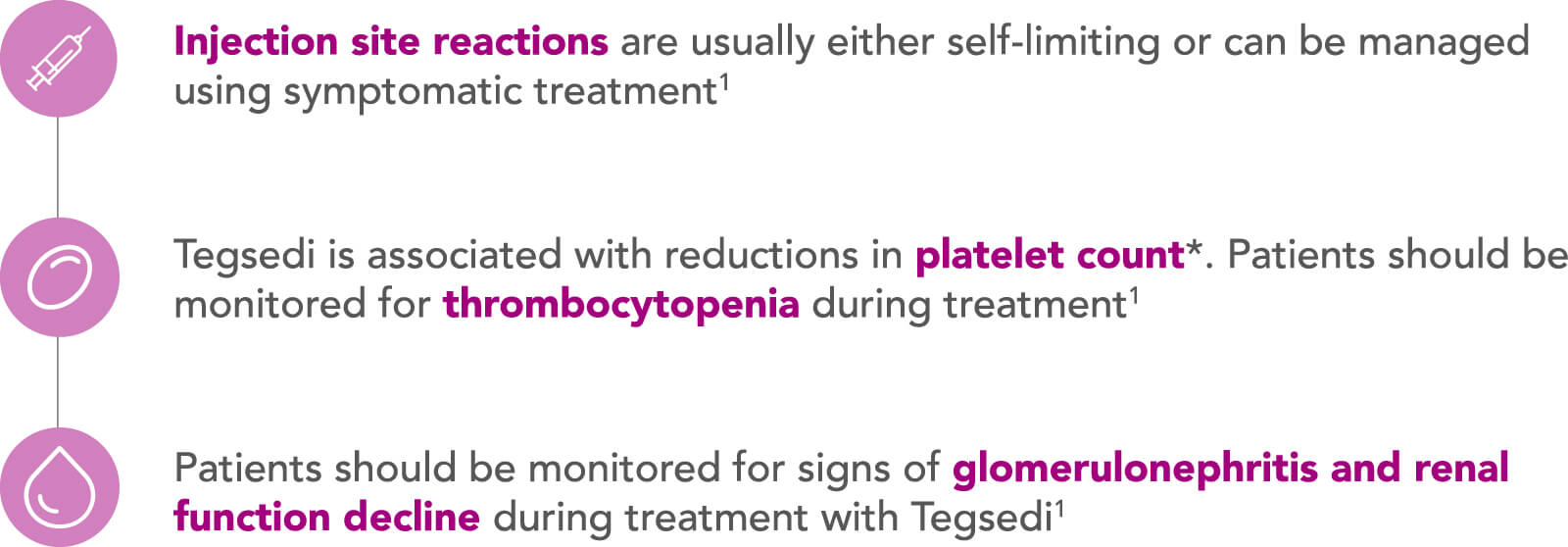This information is for healthcare professionals based in EU countries only.
Are you a healthcare professional?
Tegsedi has a manageable safety profile2,3, based on up to 6 years of clinical trial experience1
The open label extension of the NEURO-TTR study show that platelet and renal function monitoring continued to be effective in managing the identified risks of thrombocytopenia and acute glomerulonephritis3
*In the pivotal Phase-3 NEURO-TTR study, platelet count reductions to below normal (140 x 109/l) were reported for 54% of patients on Tegsedi versus 13% of placebo patients. Three (3%) patients developed platelet counts < 25 x 109/l; one of these patients experienced a fatal intracranial haemorrhage.

Thrombocytopenia: Tegsedi is associated with reductions in platelet count, which may result in thrombocytopenia. Monitor platelet count every 2 weeks during treatment and for 8 weeks following treatment discontinuation. Patients should be instructed to report immediately any signs of unusual or prolonged bleeding. Special caution should be used in elderly patients, those taking antithrombotic or antiplatelet medications, medicines that may lower blood count and in patients with a history of major bleeding events.
Glomerulonephritis/renal function decline: Glomerulonephritis and renal function decline without signs of glomerulonephritis have been seen in some patients. Monitor UPCR and eGFR every 3 months or more frequently, as clinically indicated, based on history of chronic kidney disease and/or renal amyloidosis. Caution should be used with nephrotoxic medicinal products and other medicines that my impair renal function.
Vitamin A deficiency: Tegsedi is expected to reduce plasma vitamin A (retinol) below normal levels. Before Tegsedi initiation, correct levels below the lower limit of normal .and ensure any ocular symptoms or signs of vitamin A deficiency have resolved. Patients treated with Tegsedi should take oral supplementation of 3000 IU vitamin A per day.
Liver monitoring: Measure hepatic enzymes 4 months after initiation of treatment and at least annually thereafter.
Liver Transplant Rejection: Cases of liver transplant rejection have been reported in patients treated with Tegsedi. Patients should be monitored for signs and symptoms of transplant rejection during treatment with Tegsedi. Discontinuation of Tegsedi should be considered in patients who develop liver transplant rejection.
Pregnancy and lactation: Not to be used in pregnancy, unless required by clinical condition of the woman. Exclude pregnancy before initiation.
This information is for healthcare professionals based in EU countries only.
Are you a healthcare professional?